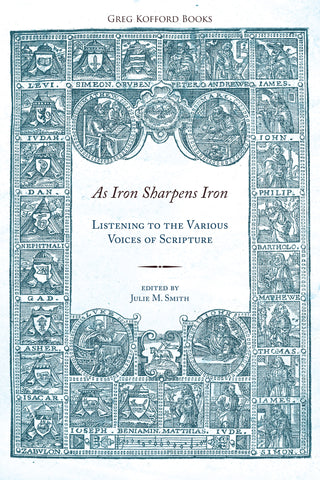News
Author spotlight: Julie M. Smith November 08 2017
 |
|||||||
|
Julie M. Smith, author of Search, Ponder, and Pray: A Guide to the Gospels, part of the Contemporary Studies in Scripture series, and editor of As Iron Sharpens Iron: Listening to the Various Voices of Scripture, winner of the 2016 AML best religious non-fiction award. When and how did you decide to pursue religious studies and Biblical Studies? What is your emphasis in Biblical Studies? I was in college, at UT Austin, as an English major. And I was taking a British literature class from a professor who wanted us to understand the religious backdrop to what we were reading. I was fascinated by her brief description of early Christianity, and that began my interest. Within Biblical Studies, I have two main focal points of interest. The first is what I can non-androcentric interpretation. While I'm comfortable using the word "feminist" in other contexts, in this context I like "non-androcentric" because what I am striving to do is to remove a male focus from interpretation (not necessarily to replace it with a feminist ideology). Secondly, I am interested in literary interpretation. In what ways do you think Search, Ponder, and Pray and As Iron Sharpens Iron can help Latter-day Saints gain a deeper appreciation for and understanding of scripture? Search, Ponder, and Pray presents some background material and then it leaves the reader to reach her own conclusions. I'm trying to model a process there that I hope all teachers would use. But I'm also trying to give students of the scripture some tools with which to do their own thinking about what they are reading. Similarly, with the Iron book, the goal was to present two not-necessarily-harmonious viewpoints about an issue, each couched in the voice of a scriptural author, in order to get the reader thinking about various arguments. You have taught LDS seminary. If those in charge of seminary curriculum came to you for advice in shaping future instruction manuals and training, what advice would you offer? I haven't taught seminary in a long time. But my advice for seminary curriculum would be this: y'all did a great job on the church history side in being sure that our youth are exposed to the difficult issues in church history in a faithful context so that they won't be blindsided by these issues when they are older. Now we need to do that for the Bible as well. Our materials on the Old and New Testament read as if they were written in the late 19th century. We saw the need to update church history materials to address 21st century needs--the next step is to make the same changes for our Bible curriculum. Thanks, Julie! |
|||||||
|


